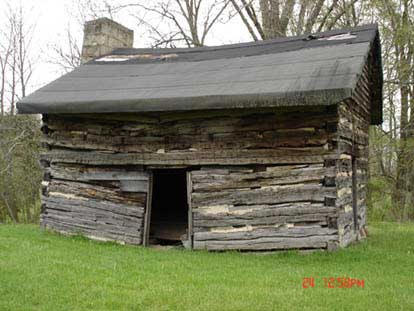|
William P. Yates

"Buried Treasures"
Local history on display in Ona
Zack Pettit
Staff Writer
Huntington- A town like Ona, W.Va. doesn't have too much going on a lot of
the time. Sometimes that is a good thing and sometimes it can be kind of
boring. But if only more people would realize how much important history is
tucked away behind the trees and under the hills, everyone could gain a
better perspective on how important our local predecessors were to the
advancement of the country.
One very accessible part of this history is the Yates, or Yatesmont Cemetery
on the Burdette Farm in Cabell County. The cemetery holds the remains of
former slave owner, William P. Yates, his family and his slaves, along with
the grandparents of William Jennings Bryan.
The cemetery is hidden from view down a typical West Virginia gravel road.
The two-story home of the Yates is still in excellent condition with old
maple trees rooting everywhere in the front yard. An old barn sits in the
background with doors closed, like she knows her winter rest has expired and
must now get ready for another hot summer.
Yates was a native of Culpepper County, Va., a soldier in the War of 1812, a
member of the first church in Cabell County, the Mud River Baptist Church,
that still stands today and a slave owner.
Bryan was known as "The Great Commoner" and "The Boy Orator of Platte." He
was a presidential candidate three, almost four times, a respected lawyer
and the secretary of state under Woodrow Wilson.
The Burdette's, who still own the land, were relatives of the Yates' through
the marriage of Williams Yates' daughter, Elizabeth, to James R. Burdette in
1828.
Don Chapman has lived close by the cemetery since he was a young boy, and he
recalled all the times he used to come over to the farm and play.
"We used to pilfer through the slave houses and find old letters and
things," Chapman said. He also admitted that if it weren't for the naiveté
of his childhood, he would have held onto some of the things he found in
those old slave houses.
One of the slave houses still stands on the Burdette Farm, its wood beams
waterlogged and split and a demeanor showcasing the exhaustion the former
inhabitants must have felt.
Other than the prolific men and women buried at the Yates Cemetery, there
are also seven tombstones that do not bear a last name. These graves are the
slaves owned by W.P. Yates. From Henry to George and Harriet to one stone
simply marked "Infant," for slaves to be buried in the same lot as their
owners was something of an anomaly.
"It says that Mr. Yates was probably pretty good to his slaves," Chapman
said.
Candie Freeman, coordinator of the Cabell County Web site and genealogist,
was also somewhat curious as to the close quarters of the slave and their
owner.
"It's rare. They usually didn't bury the slaves at the same place," Freeman
said.
Inside the gates of the cemetery, the vast majority of the tombstones were
in excellent condition. W.P. Yates had a very commanding headstone, but
there is a lesser known fact concerning his footstone.
"They took his original tombstone, cut it in half and made it his
footstone," Freeman said. She also pointed out the current heir to the farm
was actually unaware of the stone switching.
The amount of history in the greater Cabell County area is astounding, and
moreover, it takes very little effort to reveal.
Note: The link below takes you to
the Cemetery page
for the Yates/Yatesmont Cemetery.
[
Cemetery ]

|